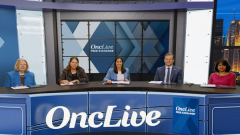
The PHAEDRA Study and Clinical Trial Landscape in Endometrial Cancer
A panel of gynecologic oncologists review the PHAEDRA study and discuss the overall treatment landscape for endometrial cancer.
Episodes in this series

Transcript:
Ritu Salani, MD, MBA: I want to highlight a couple of abstracts that were presented. Bhavana, I’m going to start with you. [The phase 2 PHAEDRA trial looked at the] impact of mismatch repair deficiency and other molecular markers on clinical outcomes using durvalumab [and] a PD-L1 inhibitor in advanced endometrial cancer. What are your thoughts on this study?
Bhavana Pothuri, MD: This was an interesting abstract because it broke down responses based on whether you had a true Lynch [syndrome] vs a somatic mutation vs a methylation. It showed that in Lynch, there was a 100% response. Keep in mind that it was 4 patients. In the somatic [mutation] it was also quite high, 75% for 4 patients. It was much lower in the methylated. This is the controversy that we’ve been hearing in smaller retrospective looking at these data. We’ve an opportunity to look at this in our larger trials, like DOMENICA and KEYNOTE-C93, and try to home in on the population that can benefit from immunotherapy in lieu of chemotherapy. These data are provocative in terms of making us smart about how we’re going to look at other upcoming trials.
Matthew A. Powell, MD: I liked the data. They confirmed what the Yale group had published, the Oklahoma group had published, and 1 of the big database studies that we published: the methylated group is going to need something more. That may be where GY018 and RUBY come in. That’s the group that should be targeted in the dMMR [mismatch repair deficient]. We’ll learn more from KEYNOTE-C93 and DOMENICA, but understanding these mechanisms of resistance is crucial. Moving forward, we’ll be going beyond that, saying defective mismatch repair and promoter methylated MLH1 so we understand what to do. We have another trial for those patients, also with the use of ipilimumab-nivolumab, with GY025. Is dual immune checkpoint going to overcome some of the things we’re seeing with the promoter methylated patient population.
Ritu Salani, MD, MBA: To remind ourselves, KEYNOTE-C93 is looking at pembrolizumab vs carboplatin-paclitaxel, and DOMENICA is looking at dostarlimab vs carboplatin-paclitaxel in the deficient mismatch repair group. Carboplatin-paclitaxel is the control arm. What do you think about that in this population?... We’re no longer accruing into these trials, but what do you guys think about that? How do we interpret these data?
Shannon N. Westin, MD, MPH, FACOG: It’s going to be hard. It’s the same thing that keeps happening. We do our best to anticipate what the landscape is going to look like when we’re designing the trial. Unfortunately, things change so fast—fortunately as well because we’re getting new opportunities for patients. But by the time the next set of trials finish, it’s a little harder to interpret. There’s going to be a hardy amount of cross-trial comparison and teasing out of populations molecularly, but it’s a little tricky. That being said, if the checkpoint alone looks good, individuals are going to be enthusiastic about it. Based on what we’re seeing in other cancer types—melanoma, colorectal, and others—you may see uptake of that in the absence of a definitive trial.
Ritu Salani, MD, MBA: Especially with the platinum shortage.
Ursula A. Matulonis, MD: Exactly.
Bhavana Pothuri, MD: There are patients who don’t want chemotherapy.
Ursula A. Matulonis, MD: They don’t. I totally agree.
Bhavana Pothuri, MD: This is another option. It’s important to have options for our patients.
Ursula A. Matulonis, MD: Shannon’s point is absolutely [true]. You’ve had many trials, and the trial that gets out of the gate first and reports positive sets the standard. We’re seeing this with PARP inhibitors, and we’re seeing this in I/O [immuno-oncology]. RUBY and GY018 are leading the way, defining the new standard of care. Everything else is going to have to be interpreted around those.
Matthew A. Powell, MD: That impacts LEAP-001, which is going to be 1 of our big studies coming out over the next 6 months, looking at lenvatinib-pembrolizumab vs carboplatin-paclitaxel. How do we interpret those results? It’s probably going to come down to subsets and who wants chemotherapy-free intervals. One outlier in this whole discussion about promoter methylation is the GARNET study. When [its investigators] looked at promoter methylation vs somatic or germline defective mismatch repair, they didn’t see a difference. Maybe there are differences in the checkpoint inhibitors as well. I don’t know. It’s an exciting time to sort all this out.
Bhavana Pothuri, MD: It’s important to keep in mind that in the GARNET, they used a surrogate. They didn’t test. We have to take those data with a grain of salt.
Matthew A. Powell, MD: That’s a good point.
Transcript edited for clarity.





































